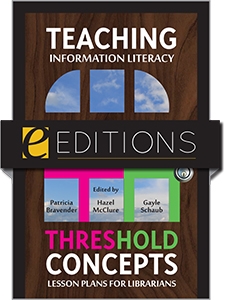
Teaching Information Literacy Threshold Concepts: Lesson Plans for Librarians—e-book
The download link for this product can be found on the final confirmation screen after you complete your purchase, and may also be accessed from your Account Profile. For more information about ALA eEditions file types and how to view them on eReaders, desktop computers, and other devices, see this page.
Primary tabs
You don't need to be an ALA Member to purchase from the ALA Store, but you'll be asked to create an online account/profile during the checkout to proceed. This Web Account is for both Members and non-Members.
If you are Tax-Exempt, please verify that your account is currently set up as exempt before placing your order, as our new fulfillment center will need current documentation. Learn how to verify here.
- Description
- Table of Contents
- About the authors
Teaching Information Literacy Threshold Concepts: Lesson Plans for Librarians is a collection designed by instruction librarians to promote critical thinking and engaged learning. It provides teaching librarians detailed, ready-to-use, and easily adaptable lesson ideas to help students understand and be transformed by information literacy threshold concepts. The lessons in this book, created by teaching librarians across the country, are categorized according to the six information literacy frames identified in the ACRL Framework for Information Literacy in Higher Education (2015). This volume offers concrete and specific ways of teaching the threshold concepts that are central to the ACRL Framework and is suitable for all types of academic libraries, high school libraries, as well as a pedagogical tool for library and information schools.
Editors' Preface………………………………………………………………………..
Introduction……………………………………………………………………………
Chapter 1 Scholarship as Conversation.....................................................................
The Conversational Nature of Sources……………………………………….. Andrea Baer
Using Information as a Springboard to Research……………………………..
Emily Frigo and Jessalyn Richter
Mapping Scholarly Conversation……………………………………………..
Kathleen Anne Langan
Crafting a Credible Message………………………………………………….
Debbie Morrow
Starting Points: The Role of Blogs in Scholarly Conversation………………
Brandon West
Chapter 2 Research as Inquiry……………………………………………………...
Flawed Questions: Tools for Inquiry…………………………………………
Smita Avasthi
Crime Scene Investigation as an Analogy for Scholarly Inquiry…………….
Robert Farrell
The Research Discussion…………………………………………………….
Charissa Jefferson
Developing a Research Question: Topic Selection Lesson Plan…………….
Kevin Michael Klipfel
The Connection between Personal and Academic Research………………..
Sarah Naumann & Sami Lange
Chapter 3 Authority is Constructed and Contextual…………………………….
Evaluating Information Sources…………………………………………….
Robert Farrell
Determining the Relevance and Reliability of Information Sources……….
Nancy Fawley
Establishing Evaluation Criteria……………………………………………
Steven Hoover
Non-Scholarly Formats as Research Tools…………………………………
Rachel M. Minkin
Scholarly/Non-Scholarly…………………………………………………...
Jo Angela Oehrli and Emily Hamstra
Chapter 4 Information Creation as a Process…………………………………..
Using Sources to Support a Claim…………………………………………
Dani Brecher
Information Life Cycle…………………………………………………….
Toni M. Carter and Todd Aldridge
Tracing Information over Time……………………………………………
Xan Goodman
Chapter 5 Searching as Strategic Exploration………………………………….
From Nothing to Something: Transforming the "Failed" Search…………
Ika Datig
Context through Citation………………………………………………….
Jenny Fielding
What is a Database?....................................................................................
Samantha Godbey, Sue Wainscott and Xan Goodman
Who Cares? Understanding the Human Production of Information…….
Rebecca Kuglitsch
Password: Keyword Edition……………………………………………...
Melissa Langridge
Approaching Problems Like a Professional……………………………...
Melissa Mallon
Databases vs. Search Engines Game……………………………………..
Elizabeth Martin and Rebecca Daly
Keywording………………………………………………………………
Cate Calhoun Oravet
Framing a Topic for Library Research…………………………………..
Melissa Browne, Caitlin Plovnick, Cathy Palmer, and Richard Caldwell
Systems of Organization………………………………………………..
Pete Ramsey and Stephen "Mike" Kiel
Chapter 6 Information Has Value…………………………………………….
Gray Areas in Plagiarism Cases…………………………………………
Smita Avasthi
The Who, What, and Why of the Creative Commons…………………..
Rebecca Bliquez and Jane Van Galen
Recognizing Plagiarism…………………………………………………
Patricia Bravender and Gayle Schaub
Plagiarism v. Copyright Infringement………………………………….
Patricia Bravender
Louder than Words: Using Infographics to Teach the Value of
Information And Authority……………………………………..
Hazel McClure and Christopher Toth
Ethical Use of Information in Presentations……………………………..
Debbie Morrow
Lessons with Overlapping Information Literacy Threshold Concepts………
Appendix………………………………………………………………………….
Lesson Handouts………………………………………………………….
ACRL Framework for Information Literacy for Higher Education………
About the Editors…………………………………………………………………
Contributors……………………………………………………………………………
Recommended Reading………………………………………………………
Hazel McClure
Hazel McClure is the liaison librarian to English, Writing, and Environmental Studies at Grand Valley State University. She holds an MFA from Saint Mary's College of California and an MLS from State University of New York at Buffalo. Her research interests are collaboration with disciplinary faculty, threshold concepts, and poetry publishing models.
Patricia Bravender
Patricia Bravender is a professional programs librarian and liaison to Legal Studies, Criminal Justice, and Hospitality and Tourism Management at Grand Valley State University in Allendale, Michigan.She is also an adjunct faculty member in the School of Criminal Justice at GVSU where she supervises the internship programs in legal studies.She holds an MLIS from Wayne State University.In addition to threshold concepts, her research interests are information privacy and censorship.
Gayle Schaub
Gayle Schaub is the Liberal Arts Librarian at Grand Valley State University Libraries. She holds an MLIS from the University of Wisconsin Milwaukee and an MA in Teaching English as a Foreign Language from the American University in Cairo. Gayle’s other research interests include library services to international students and information literacy in K–12 education.


